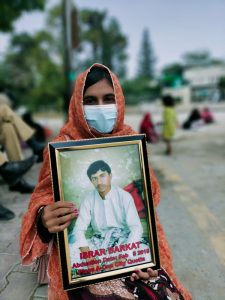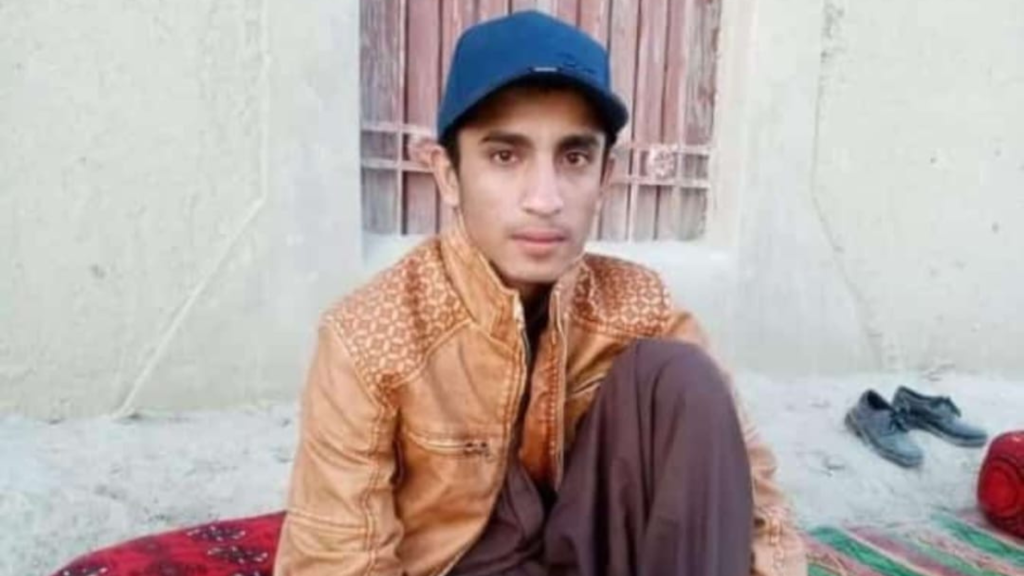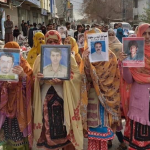For years Chakar Majeed carried a withdrawn uncaring face. It was unusual. Because he was not always like that. As a child, he was very lively. Some said it was because of the torture he endured. But many other torture victims that I had seen or had the opportunity to video call seemed to be engaged.
But Chakar did not care. He avoided all and everything. His eyes did not sparkle when somebody spoke of freedom or revolution, neither did he show a sign of fear when one spoke of the army´s brutalities. It appeared, he had mastered the art of being numb.
Maybe all he wanted was an escape. That´s why, he would sometimes stop hearing and seeing things around him for hours, even though his eyes were open and even though he was walking.
It was a mystery how he achieved it. The local Mullah who the people had known to have the power of banishing evil and ghosts with the help of the Quran, explained that Chakar’s soul travels to some other place and the soulless body would then wander in search of the soul. He would regain consciousness after a while when both the soul and body meet up again.
Guys of his age would joke that he was like a defective mobile who would alternate by getting connected and disconnected to Wifi. Chakar himself could never explain how he got disconnected from the world. The only thing he said was that he felt better after these disconnections.
The Mulla was of the opinion that since the Quran did not have a Mantra to heal the souls of the torture victims, he could do nothing. On the other hand, the psychiatrist explained these were mere disassociation episodes. According to him, these were normal reactions of his mind to stop negative memories of torture from haunting him back.
Chakar Majeed was from my extended family. His grandfather, after whom he was named was my father’s cousin. The kid had never seen peace. He was born at a time when Balochistan was already torn by war. Enforced disappearances, extrajudicial executions, collective punishments, fake encounters, and military raids are daily events. Every other household is somehow affected by the war. Families of political activists and militants are equally under the military’s watch. Chakar Majeed was doomed to fall under the military’s watch, as his cousin Mohammad Jan aka Baba Darvesh was a Balochistan Liberation Front militant. Darvesh was killed during an encounter with the forces a few years ago.
After Mohammad Jan’s death, the male members of his family had to leave their houses and flee, leaving behind women and children who were thought to be relevantly safer.
But assumptions are not always true and in the last week of March 2019, the army raided Chakar Majeed’s house. When the forces didn’t find any adult male, they whisked him away. He was only 13 years old at the time. For the next ten months, no one heard of him. He was kept in incommunicado detention for the entire period of his detention and ten months later, he was released without any explanation.
Chakar was immediately taken to Karachi for treatment but he never returned to normalcy. The people of his village assumed his disassociation episodes as drug binges, disregarding the trauma he had been through.
“Even though he was not the same child I was happy that at least my son returned. Look at Gul Bibi, no one knows where her son is”, said Chakar’s mother.
Gul Bibi is our neighbor and a member of our extended family. Her son, Israr Barkat, and nephew, Rafiq Umer went to Quetta for higher studies. In February 2015, both were abducted and forcibly disappeared during a raid on their apartment. Rafiq Umer was released in February 2021, after six years of disappearance. However, Israr Barkat’s whereabouts are still unknown. Israr was a 15-year-old at the time of his abduction.

When I spoke to Chakar about the treatment during his detention. He said: ”I don’t know how long the physical torture lasted.” He would stop feeling it after some time. The worst part according to him was the mental torture and it continued until the day he was released. “I was told to get prepared for dying and they were kind enough to ask me where shall they dump my body so that the people could find and identify me. I recalled whatever I could, because I thought they are going to kill me today”.
His sufferings did not end there. Soon after his return from Karachi, he started receiving calls from the very torturers. He was told that he must work for them as an informant to avoid ending up again in the dungeon. He stopped using mobile phones, to avoid the calls.
But it didn’t stop the officers from harassing Chakar. Soon the officials found one of his cousins’ numbers. In the last week of October, the number start receiving multiple calls from Police headquarter in Turbat. They were told that Station House Office (SHO) Sher Jan wants to meet him. Chakar’s cousin accompanied him to the police station. The police took them to the military camp. In the camp, both were separated for 8 hours. No one knows what happened in those 8 hours. On his return, Chakar was given a mobile phone and Rs. 3000 and was advised to be in contact.
On November 2nd, Chakar came back home. He was cheerful for the first time after so many years. He did not disassociate on that day, had dinner with his family, visited his old friends till late at night. It is said at around 1:00 am, he hanged himself. It was his final disconnection from the world.
For days Chakar’s pictures were rotating in front of my eyes and occupied a significant amount of space in my mind. Why would a 13-year-old kid deserve to be tortured and detained for ten months? What he had been through after the harassment had continued after his release. What compelled the 16-year-old boy to end his life? It’s haunting.
In the same week, another couple Lutfullah and his wife committed suicide after multiple raids and harassment by forces on their house in the Kharan district of Balochistan. And the Impunity persists.


